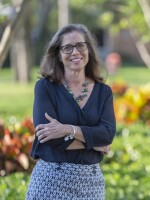It’s been a year since 49 people died in a mass shooting at the Pulse gay nightclub in Orlando.
It happened in a city best known as a wholesome family vacation destination, but one that has also unofficially been host for the past 25 years to Disney’s Gay Days. That event attracts about 150,000 people a year to local attractions, hotels, restaurants and clubs.
When the massacre at Pulse happened, the nation – and the city of Orlando -- responded by unifying around the LGBT community. Visit Orlando today and you’ll see the rainbow flag – a symbol of the gay community – everywhere, including at the major league soccer stadium.
So, when the Orlando Sentinel last week published a guest column connecting the shootings and Gay Days to the city’s embrace of what the columnist called the “pro-gay and lesbian agenda” - some readers were outraged. People bashed the Sentinel and the journalists working there. A city councilwoman ranted on Facebook and suggested a boycott.
Kelly McBride of the Poynter Institute for Media Studies said the newspaper’s decision to publish the guest column by a consultant to Christian theme parks may have been made with the understanding that not all residents are comfortable with LGBT issues. Orlando has a large Evangelical population and history, and among the numerous theme parks in Orlando is the Holy Land Experience, she said.
“Even before the Pulse shooting, there was a wide array of opinions throughout Orlando,” she said.
What makes this reaction interesting is that metro newspapers are often accused of being too narrow or homogenous in the opinions they publish, McBride said. And while the Sentinel’s own editorial writers have been vocal advocates for LGBT issues, this was meant as an op-ed column, signifying the opposite of the opinions of the newspaper’s editorial board, she said.
“Although the editors recognized this would be controversial, I’m sure they felt an obligation to represent a diversity of viewpoints here,” she said.
McBride said the boycott doesn’t make sense if you believe newspapers should be a place for a variety of ideas and opinions. But she’s not surprised that the idea emerged on social media, where the column was widely shared outside the context of seeing more than one opinion.
“If social media has taught us anything, it’s that people love to get angry. It’s rewarding to tap into righteous indignation,” she said.
Orlando city councilwoman Patty Sheehan's Facebook rant calling for a boycott is a good example, McBride said. When a columnist for the Sentinel explained the paper’s role in being a place where many opinions can be expressed, she deleted her post and walked back her call for a boycott.
“She even wrote her own op-ed, apologizing for letting anger get the best of her,” McBride said.




